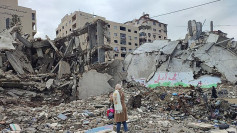The United States is sending additional troops to the Middle East as tensions escalate between Israel and Hezbollah, following a wave of Israeli airstrikes in Lebanon that left at least 274 people dead and over 1,000 wounded, according to Lebanon's health ministry.
The Pentagon announced the move on Monday, citing growing instability in the region and a desire to mitigate the potential for further violence. While the exact number of troops has not been disclosed, the deployment is meant to augment the 40,000 U.S. personnel already stationed in the area, as Washington aims to prevent the conflict from spreading beyond its current borders.
Pentagon press secretary Air Force Maj. Gen. Pat Ryder emphasized that the additional forces are being sent "out of an abundance of caution," stressing that the move was a precautionary measure, not a signal of imminent combat. "For operational security reasons, we won't comment on or provide specific details," Ryder said, but he made clear that the deployment is intended to help stabilize the situation.
The situation in the Middle East has become increasingly volatile in recent weeks, with Israel targeting Hezbollah strongholds across Lebanon in response to the group's rocket attacks on northern Israel. Monday's airstrikes, the deadliest in Lebanon since 1990, hit a wide range of Hezbollah targets, including weapon stockpiles concealed in civilian homes. Israel's military said it had struck 800 sites, a move Israeli officials described as necessary to prevent Hezbollah from launching further attacks.
"We are targeting combat infrastructure that Hezbollah has been building for the past 20 years," said Herzi Halevi, the Israeli military's chief of the general staff.
Israeli Prime Minister Benjamin Netanyahu addressed the Lebanese people directly in a video statement, urging them to evacuate areas where Hezbollah was storing weapons. "Israel's war is not with you. It's with Hezbollah," Netanyahu said. He accused the militant group of using civilians as human shields, hiding rockets and missiles in residential homes. "To defend our people against Hezbollah strikes, we must take out those weapons," he added, warning residents to leave for their own safety as the Israeli military escalates its campaign against Hezbollah.
The Israeli airstrikes have sparked widespread concern across the region and beyond, with the United States increasing its military presence as a safeguard against further escalation. The U.S. already maintains a strong naval presence in the Mediterranean and Persian Gulf, including the aircraft carrier USS Abraham Lincoln, which is stationed near the Gulf of Oman. On Monday, another aircraft carrier, the USS Truman, along with two destroyers and a cruiser, set sail from Virginia for the Mediterranean, further enhancing the U.S. military's capacity to respond to the situation.
The heightened U.S. military posture comes as the State Department urged American citizens to leave Lebanon.
"Due to the unpredictable nature of ongoing conflict between Hezbollah and Israel and recent explosions throughout Lebanon, including Beirut, the U.S. Embassy urges U.S. citizens to depart Lebanon while commercial options still remain available," the State Department warned in a statement. It remains unclear if the additional U.S. forces deployed to the region will be involved in any potential evacuation efforts.
Meanwhile, Israeli Defense Minister Yoav Gallant briefed U.S. Secretary of Defense Lloyd Austin on the situation, discussing Israel's ongoing operations and the potential for a broader conflict. Gallant described the strikes as part of a proactive defense strategy aimed at disabling Hezbollah's military capabilities. "On this day, we have taken out tens of thousands of rockets and precision munitions," Gallant said, adding that the operation is a significant blow to Hezbollah's ability to launch future attacks.
The risk of a wider regional conflict remains high, with the U.S. positioning its forces to both protect Israel and safeguard American interests in the region. Maj. Gen. Ryder noted that while the situation is dangerous, the Pentagon is working to ensure that it does not escalate into a full-scale war. "There is the potential for a wider regional conflict. I don't think we're there yet, but it's a dangerous situation," he said.
For many in Lebanon, Monday's airstrikes marked a dark turning point. Thousands of civilians received warnings from the Israeli military urging them to leave their homes in Hezbollah-controlled areas, but many officials in Lebanon, including Information Minister Ziad Makary, dismissed the calls as psychological warfare. The country, still reeling from its ongoing political and economic crises, now faces the grim reality of being caught in the crossfire of a growing regional conflict.






